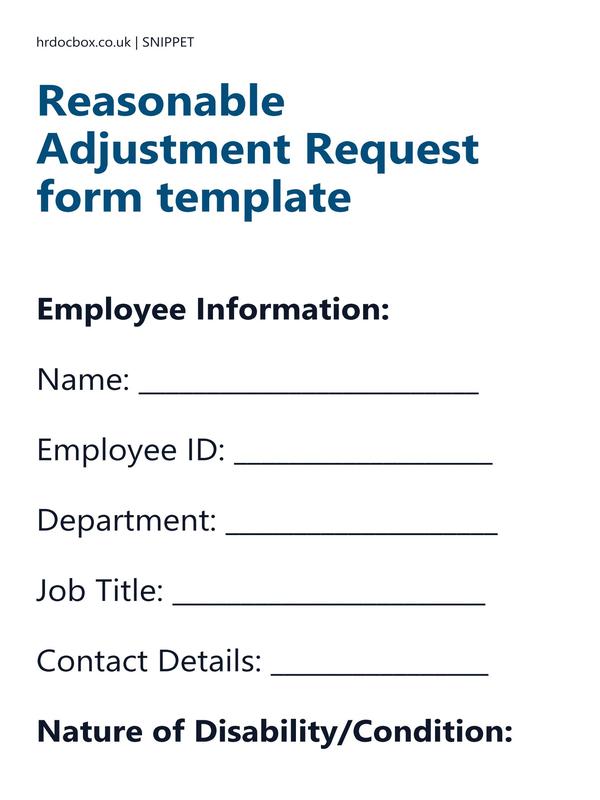Reasonable Adjustment Request form template


Our Reasonable Adjustment Request Form Template enables employees to request accommodations, ensuring inclusivity and compliance with disability regulations.
- Includes 12 months' access to the Reasonable Adjustment Request form template, with all updates provided free of charge and notified to you.
- UK-specific accuracy.
- 102 words over 1 page.
- Last updated 30/09/2025.
- Format: Word / XLS / plain text / email.
- Delivery: Instant download after purchase (no physical item).
- Access: Download link shown here after checkout.
- This Reasonable Adjustment Request form template will SAVE you up to 30 mins drafting & research, save you money, and reduce your risk.
Reasonable Adjustment Request
Employee Information:
Name: _________________________
Employee ID: ___________________
Department: ____________________
Job Title: _______________________
Contact Details: ________________
Nature of Disability/Condition:
Please describe the disability/condition for which you are requesting reasonable adjustments:
Requested Adjustments:
This is a 30% preview of the Reasonable Adjustment Request form template. For instant full access, purchase this item or a parent bundle.
Reasonable Adjustment Request form template purpose
The Reasonable Adjustment Request Form allows employees to formally request accommodations or modifications to their work environment, tasks, or procedures to accommodate their specific needs or disabilities. It provides a structured process for employees to communicate their requirements, enabling employers to consider and implement appropriate adjustments to support their inclusion and participation in the workplace.
This form promotes inclusivity and equal opportunities by facilitating open communication between employees and employers regarding reasonable adjustments.
It helps ensure that employees with disabilities or specific needs receive the necessary support to perform their roles effectively and access the same opportunities for career progression as their colleagues.
Practical application of a Reasonable Adjustment Request form template
- The Reasonable Adjustment Request form template should be actioned / delivered as and when required.
- It is sent / delivered by an employee to an employer / HR team.
Compliance
Compliance
This Reasonable Adjustment Request form template incorporates relevant UK laws and HR standards, including those listed below:
-
Equality Act 2010: Mandates employers to make reasonable adjustments for employees with disabilities or health conditions.
-
Data Protection Act 2018 (incorporating GDPR): Dictates the handling of personal data within the reasonable adjustment request form in compliance with data protection principles.
-
Health and Safety at Work Act 1974: Obliges employers to ensure the health, safety, and welfare of employees, which may include making reasonable adjustments.
-
Employment Rights Act 1996: Sets the legal framework for employment contracts and terms, including the provision of reasonable adjustments.
-
Disability Discrimination Act 1995 (DDA): Though repealed, previous versions of the DDA established obligations similar to those in the Equality Act regarding reasonable adjustments for disabled employees.
Reasonable Adjustment Request workflow
Reasonable Adjustment Request workflow
Check which resources should be implemeted before and/or after the Reasonable Adjustment Request form template, to understand the workflow.
Reasonable Adjustment policy
Our Reasonable Adjustment Policy Template ensures fair treatment and accessibility for employees with disabilities, outlining procedures for identifying, implementing, and reviewing accommodations to support their work performance and wellbeing.
Reasonable Adjustment Assessment Checklist form
Our Reasonable Adjustment Assessment Checklist Form Template helps evaluate and implement accommodations, ensuring fair treatment and accessibility for employees with disabilities.
Frequently Asked Questions about a Reasonable Adjustment Request form template
Frequently Asked Questions about a Reasonable Adjustment Request form template
-
Can I use the Reasonable Adjustment Request form template in my small business?
Yes. The Reasonable Adjustment Request form template is designed to be flexible and suitable for organisations of all sizes, including small businesses and charities. It follows UK employment law best practice, so even if you don't have an in-house HR team, you can confidently apply it.
-
Is the Reasonable Adjustment Request form template compliant with 2026 UK employment law?
Absolutely. Like the Reasonable Adjustment Request form template, all of our templates are drafted with the latest ACAS guidance and UK employment legislation in mind. We review and update them regularly, so you can be confident they remain compliant.
-
Can I customise the Reasonable Adjustment Request form template for my organisation?
Yes, we highlight the areas of the Reasonable Adjustment Request form template that you need to update with your own details, and where you need to make decisions to suit your situation. This saves you time and ensures that you meet best practice.
-
Do I get instant access to the Reasonable Adjustment Request form template?
Yes. Once purchased, you'll be able to download the Reasonable Adjustment Request form template instantly. Templates are provided in editable Word or Excel format so you can customise them easily, and in PDF format for easy sharing.
-
What if I need more help, not just a Reasonable Adjustment Request form template?
If you're looking for broader support, we also offer toolkits and library bundles that include the Reasonable Adjustment Request form template, along with other HR templates and policies for fully managing your situation. These may be more cost-effective if you need deeper advice.
-
Why should I use this Reasonable Adjustment Request form template, and not AI to generate it?
The risk of using a free AI-generated template 'without review' includes your legal exposure, missing context, and no awareness of the wider process, whereas purchasing the Reasonable Adjustment Request form template from us mitigates that risk.
